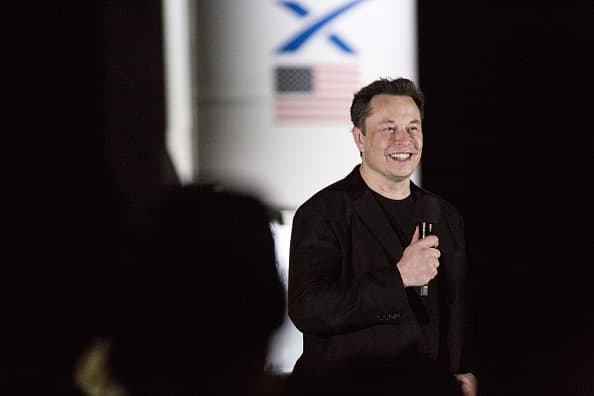Elon Musk is never one to shy away from setting ambitious goals. In fact, the billionaire’s most ambitious goal might just be the one he often talks about the most: going to Mars.
On Wednesday, Musk and his private spacecraft company, SpaceX, nearly checked off a historic milestone that could put him another step closer to one day achieving that goal. That milestone would be SpaceX’s first-ever manned space mission. The company was set to launch two NASA astronauts on a flight taking them to the International Space Station, but SpaceX postponed the launch at the last minute due to inclement weather. SpaceX and NASA will now look to push the launch to Saturday, May 30, at 3:22 p.m. ET.
As CNBC has previously noted, the mission is a major milestone for both SpaceX and the U.S. space program, as NASA has not launched astronauts from the U.S. since 2011 and is in the midst of a pivot to commercial space flight that’s seen private companies like SpaceX, Jeff Bezos’ Blue Origin, Boeing and others receive multibillion-dollar contracts to build rockets for the government’s space agency.
The SpaceX Falcon 9 rocket with the Crew Dragon spacecraft attached sits on launch pad 39A at the Kennedy Space Center on May 27, 2020 in Cape Canaveral, Florida.
Joe Raedle | Getty Images
For Musk personally, though, a successful mission would be something of a culmination of his efforts to build a viable private space company. Musk founded SpaceX in 2002 (two years before he joined electric car company Tesla) with the goal of eventually building more affordable spacecraft that would make it possible to one day reach and colonize Mars.
In order to attain that goal, Musk and SpaceX first have to prove that their reusable rockets (which would make space flight substantially cheaper by allowing rockets to be used for multiple missions instead of just once) can safely and efficiently launch humans into orbit.
To that end, this week’s launch, if it is successful, would go a long way toward proving SpaceX is a viable option for future manned NASA space missions. For that reason, the mission’s success would be a necessary stepping stone toward Musk’s ultimate goal of launching humans on space flights that will transport them all the way to Mars.
Musk has said in the past that he plans to send an unmanned SpaceX rocket to Mars, carrying only cargo, by 2022, according to SpaceX. Of course, it remains to be seen how feasible that plan actually is, much less Musk’s plan for a second mission that would transport humans to the Red Planet by 2024.
Musk has a habit of setting ambitious goals for his companies that do not always come to fruition. However, Musk’s goal of one day colonizing Mars is also one that he’s had his sights on for nearly two decades. Musk has said that reading sci-fi author Isaac Asimov’s “Foundation” saga helped inspire him to found SpaceX because it opened his eyes to the idea of prolonging human civilization by “[building] spaceships to extend the human species’s reach” to planets other than Earth.
In 2001, a year before founding SpaceX, Musk was fresh off selling two of his previous start-ups (Zip2 and X.com, the latter of which became PayPal) for hundreds of millions of dollars.
Looking for his next project, Musk cold-called scientists like engineer and aerospace consultant Jim Cantrell to ask about the feasibility of buying Russian rockets — because they were the cheapest available — that he wanted to use to reach Mars. A year later, he founded SpaceX with the goal of building reusable rockets himself that could one day make reaching Mars possible.
In a 2018 interview with Wired, Cantrell said that Musk’s focus with SpaceX has always been more about eventually reaching Mars than on making money.
“Elon really doesn’t care about the money — he wants to go to Mars,” Cantrell said. “It was always focused on Mars, none of this was focused on the market. I was the guy who had the market focus, and I was like, ‘Hey, look Elon, we’ve got to have a return on investment.’ His response to me was, ‘I don’t really give a damn about return on investment.'”
Of course, as SpaceX has grown, it’s also brought in money, including contracts from NASA worth more than $3.1 billion to fund the development of the company’s Crew Dragon space capsule that will carry the two NASA astronauts, propelled by a SpaceX Falcon 9 rocket, on their mission to the ISS. SpaceX has also raised nearly $1.7 billion from investors since the beginning of 2019, giving the company a valuation of around $36 billion.
Still, that valuation has not changed Musk’s goal of putting humans on Mars, as the billionaire has said that he wants to send a million people to Mars by 2050. And he’s even said there’s a 70% chance that he himself would eventually make the trip to Mars.
“I’m talking about moving there,” Musk said in 2018.
SpaceX did not immediately respond to CNBC Make It’s request for comment.
UPDATE: This article has been updated to show that the SpaceX launch scheduled for Wednesday was postponed until Saturday due to inclement weather.
Check out: The best credit cards of 2020 could earn you over $1,000 in 5 years
Don’t miss:
Elon Musk shares the science fiction book series that inspired him to start SpaceX
